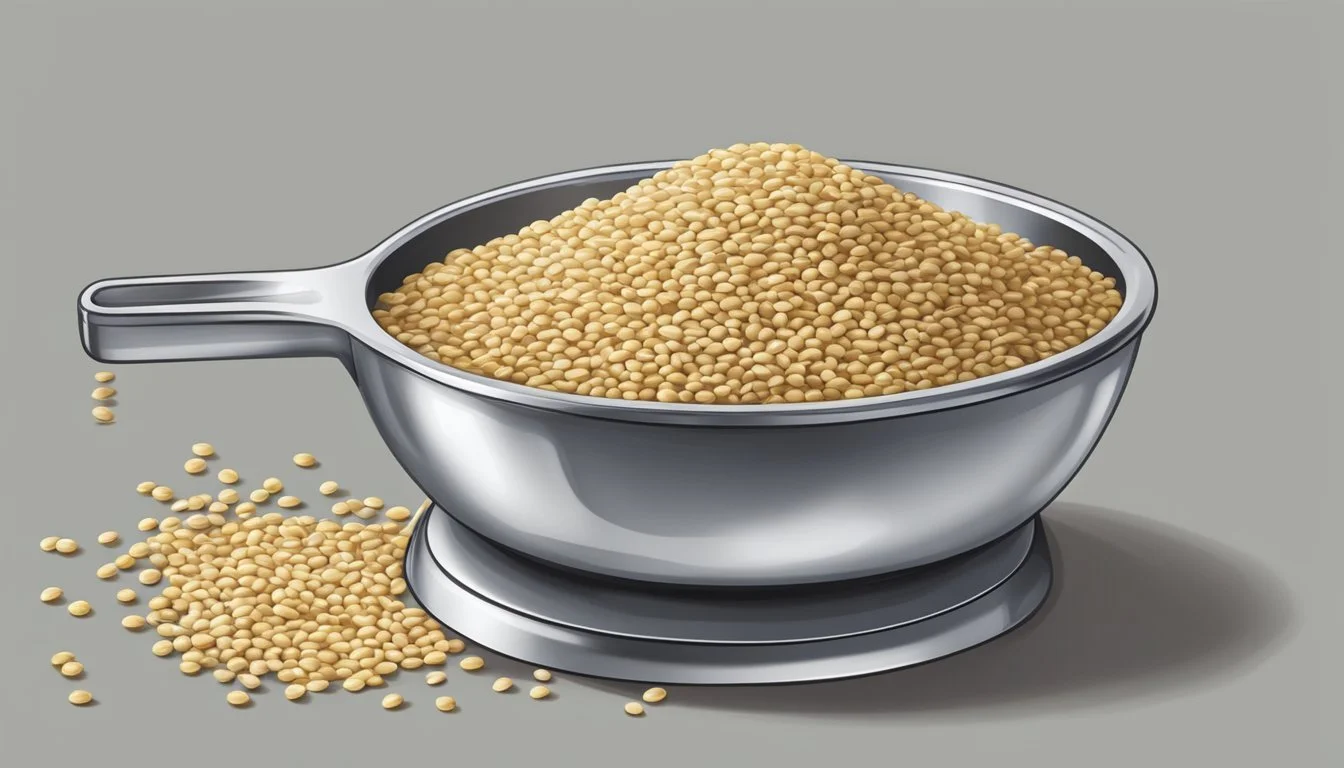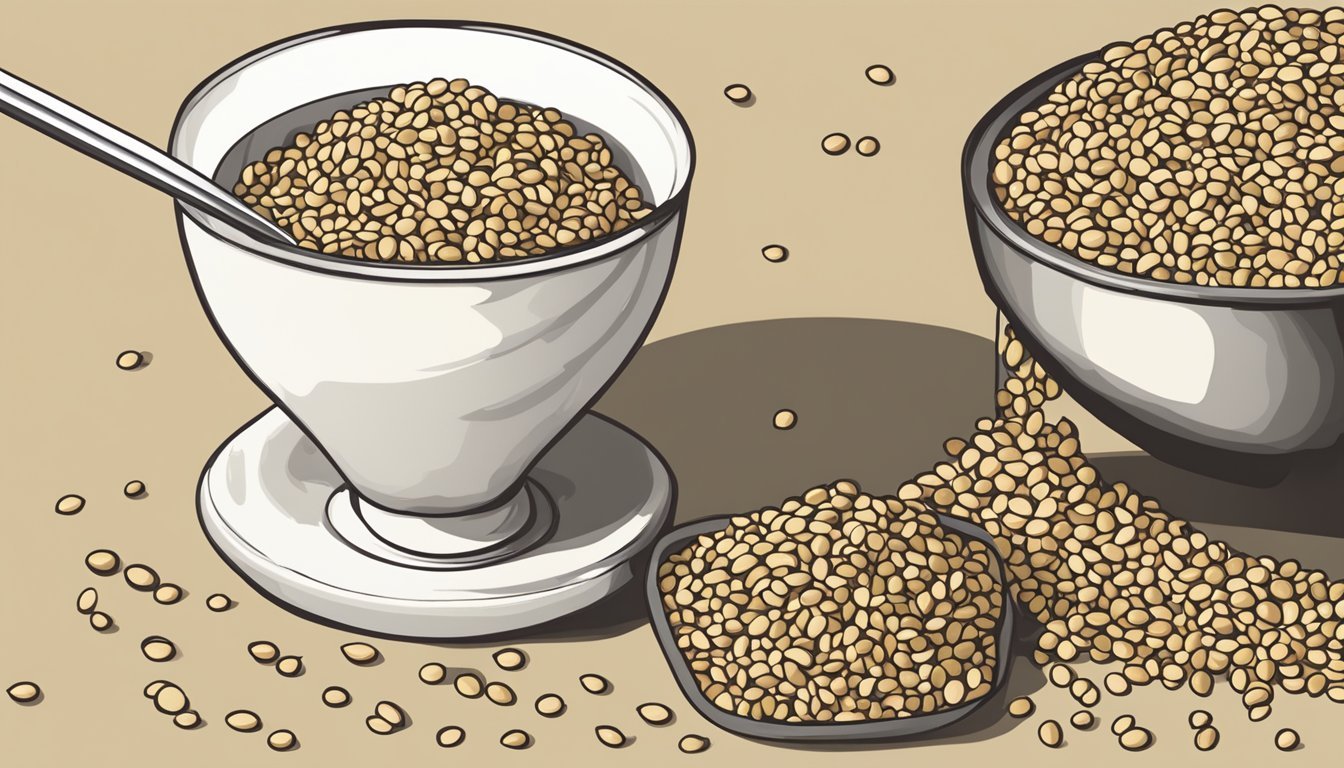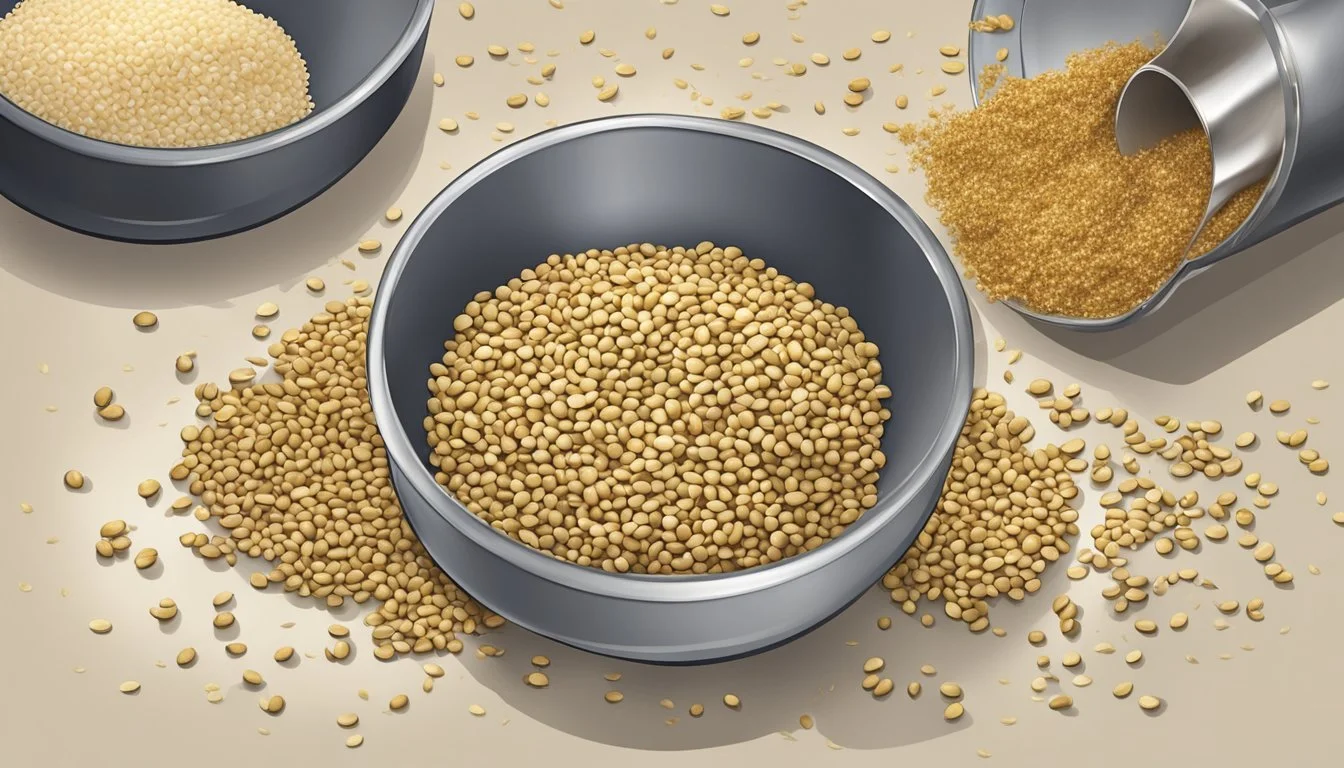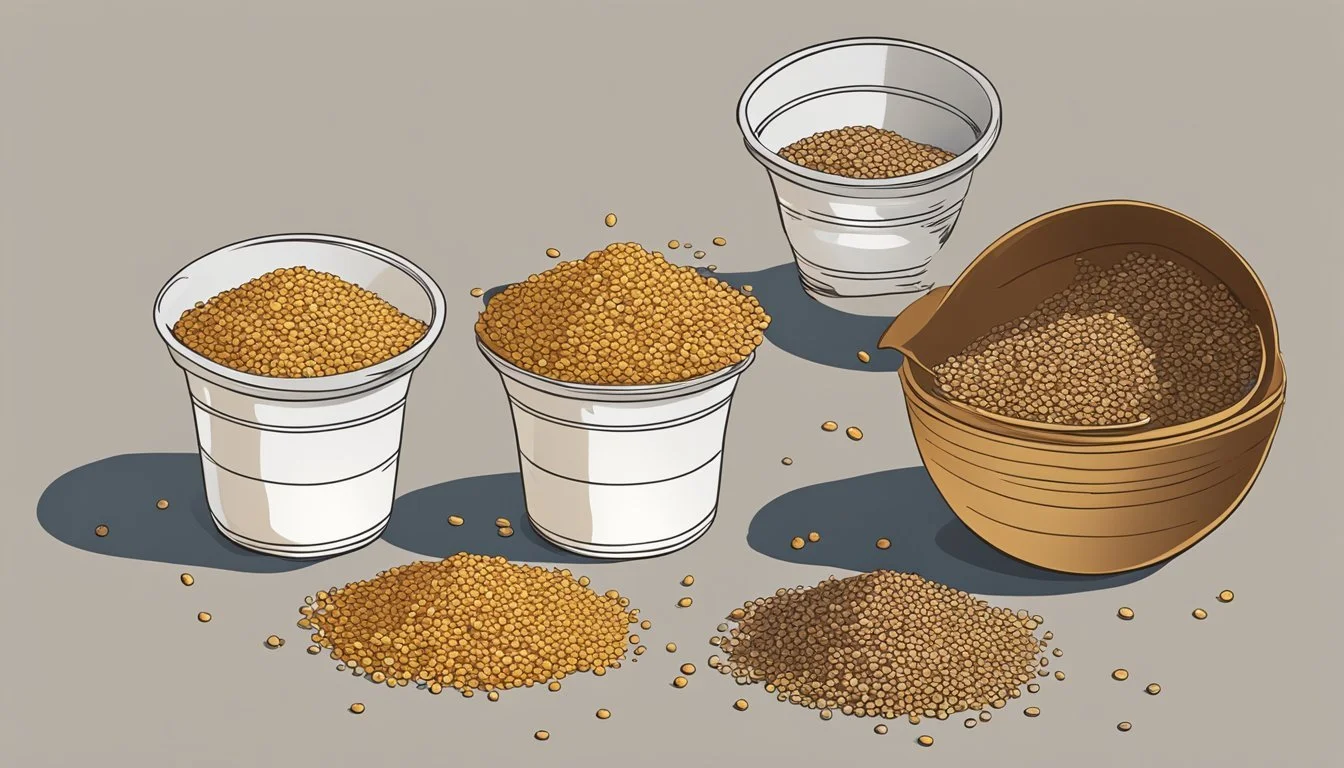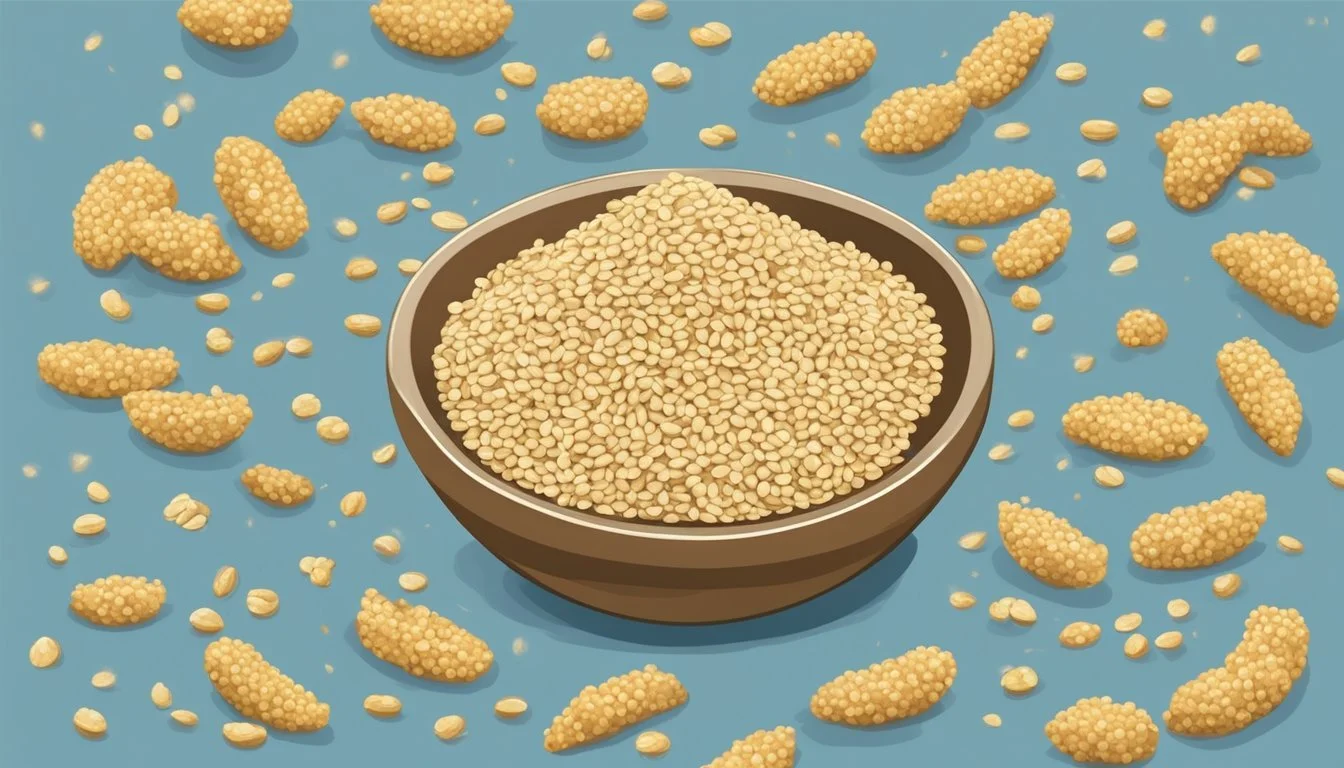How Many Cups in a Pound of Sesame Seeds?
Unveiling Measures and Conversions
Converting between weight and volume is a common challenge in cooking and baking, especially when dealing with ingredients like sesame seeds. A pound of sesame seeds is a standard measurement often used in recipes or bulk purchasing. However, for practical kitchen use, measuring by cups is more convenient, as most kitchens have measuring cups but not always a kitchen scale.
The relationship between weight and volume for sesame seeds, as for any ingredient, depends on the seeds' density and the space they occupy. Typically, one pound of sesame seeds is equivalent to approximately 3.2 to 3.5 US cups. This conversion can be useful for those looking to translate the weight of sesame seeds into a volume measurement for a recipe or to portion out their bulk purchase of sesame seeds into smaller, usable amounts.
Nutritional Profile of Sesame Seeds
Sesame seeds offer a rich blend of macro and micro nutrients that are essential for a balanced diet. They are a calorie-dense food with a substantial amount of fats, proteins, and carbohydrates, alongside essential minerals.
Macro and Micro Nutrients
Sesame seeds are a valuable source of both macronutrients and micronutrients. In terms of macronutrients, sesame seeds contain healthy fats, quality protein, and carbohydrates. Specifically, they are known for their high fat content, which is predominantly composed of heart-healthy monounsaturated and polyunsaturated fats. The protein in sesame seeds is also noteworthy, making them a beneficial addition for plant-based diets.
The micronutrient composition of sesame seeds includes vital minerals such as calcium, magnesium, phosphorus, and potassium. They also contain trace elements like zinc and copper, as well as B vitamins, which are crucial for energy metabolism and brain health.
Nutrient Type Amount in 1 tbsp (9g) of Sesame Seeds Total Fat Approx. 4.5g Protein Approx. 1.6g Carbohydrates Approx. 2g Fiber Approx. 1.1g
Caloric Content
When looking at the caloric content of sesame seeds, they are energy-dense. Per tablespoon (approximately 9 grams), sesame seeds have around 51.6 calories, largely due to their fat content. In contrast, 100 grams of sesame seeds can contain about 567 calories. It's important to consider portion sizes when adding sesame seeds to a diet due to their calorie density.
Measure Caloric Value 1 tbsp (9g) Approx. 51.6 calories 100g Approx. 567 calories
Sesame seeds' nutrient-rich profile makes them an excellent ingredient for those looking to enhance their diet with healthy fats, proteins, and essential minerals.
Essentials of Measurement Conversion
Accurate measurement conversion is fundamental to understanding the quantity of ingredients needed for a recipe. It requires knowledge of different units of measurement and how they interact.
Understanding Units of Weight
Weights in cooking are typically measured in grams, milligrams, ounces, pounds, and kilograms. The weight of an item indicates its heaviness. In the context of sesame seeds:
1 pound is equal to 16 ounces.
1 ounce equals approximately 28.35 grams.
For smaller amounts, milligrams might be used; there are 1,000 milligrams in a gram. The weight of food can affect the taste and texture of the final product, making precision important.
Understanding Units of Volume
Volume measures the space an ingredient occupies, commonly referred to in liters, milliliters, and in the case of U.S. customary units, cups. When considering sesame seeds:
1 cup is typically estimated to hold about 142 grams of sesame seeds, according to a standard density.
1 liter equals 1,000 milliliters or about 4.22675 U.S. cups.
The volume-to-weight conversion can vary based on the density or specific gravity of the substance. Foods that are loosely packed or granular, like sesame seeds, may have air pockets affecting volume measurements, thus food calculations must account for these variables.
Standard Conversion Ratios
When converting pounds to cups for sesame seeds, it is important to use the correct ratio to ensure accuracy in recipes and proper portioning.
Pounds to Cups Conversion
Pound to US Cups Conversion for Sesame Seeds:
Pounds of Sesame Seeds US Cups 0.1 pound 0.32 cup 0.2 pound ~0.64 cup 0.3 pound ~0.96 cup 0.4 pound 1.28 cups 0.5 pound 1.6 cups 1 pound 3.2 cups
Note: The chart above provides a general guideline for converting pounds of sesame seeds to US cup measurements. Due to variations in seed size and packing methods, measurements may vary slightly.
Factors Affecting Conversion
Converting pounds to cups of sesame seeds involves various factors that must be considered to achieve an accurate measurement. These include the seed's condition and type, the impact of temperature on its volume, and the food's density and specific gravity.
Seed Conditions and Types
Different conditions and types of sesame seeds can alter the conversion rate between weight and volume. Whole sesame seeds, dried sesame seeds, roasted and toasted varieties, as well as brown sesame seeds, each have unique densities. For instance, a pound of whole sesame seeds may not measure the same in cups as a pound of ground seeds, like tahini.
Impact of Temperature on Seed Volume
Temperature can affect the volume of sesame seeds, though less significantly than it would for liquids. Higher temperatures may cause expansion, altering the cup measurement while the weight remains constant. Nonetheless, standard kitchen conditions usually render this impact negligible for the volume of sesame seeds.
Food Density and Specific Gravity
The food density and specific gravity of sesame seeds determine the relationship between weight and volume. Seeds with higher density will weigh more for the same cup measurement compared to those with a lower density. It's important to note that specific gravity, which compares the density of the sesame seeds to that of water, is instrumental in conversions for recipes and commercial food production.
Practical Uses in Cooking and Baking
When incorporating sesame seeds into various recipes, understanding the conversion between cups and pounds is essential for both cooking and baking. Precise measurements ensure the success of the dish, whether it's a dessert or a savory dressing.
Recipes and Ingredient Measurements
The use of sesame seeds in recipes varies from sprinkling atop buns to providing a crunchy coating for sushi rolls. In desserts, such as sesame seed balls, accuracy in measurement is vital to achieve the desired texture and flavor balance.
Toasted Sesame Seeds for Desserts or Breads:
1 pound of sesame seeds = approximately 3.63 cups
This conversion is a guideline for recipes calling for larger quantities of seeds. For smaller, more precise measurements, it's recommended to use a kitchen scale.
Seed Oils and Dressings
Sesame seeds are often processed into oil, which is a common ingredient in dressings and sauces. When following a recipe that requires sesame seed oil, measuring by volume is common.
Sesame Seed Oil
Commonly measured in tablespoons or milliliters
A gallon weighs approximately 7.6 pounds
For dressings, a chef might combine sesame oil with other ingredients such as soy sauce, vinegar, or honey. The balance of flavors hinges on precise measurements, often down to the teaspoon.
Note: While this section does not provide an exhaustive measurement chart, it supplies the reader with specific conversions and uses of sesame seeds and oil in cooking and baking, emphasizing the importance of accuracy in these culinary practices.
Measurement Tools and Techniques
When converting sesame seeds from pounds to cups, one must consider the variations between measurement systems and the importance of accuracy.
Metric and Imperial Tools
The use of appropriate measuring tools is critical for precise conversion between pounds (lbs) and cups for sesame seeds. Imperial tools, typically used in the United States, measure weight in pounds and volume in cups, tablespoons (tbsp), and teaspoons (tsp). One pound of sesame seeds is approximately equivalent to 1.92 US cups. On the other hand, metric tools may use grams for weight and milliliters (mL) or metric cups for volume. For instance, a metric cup of sesame seeds equates to about 100 grams.
It is important to note that volume-to-weight conversion varies based on the substance's density. For sesame seeds:
1 US tablespoon = 9 grams
1 US teaspoon = 3 grams
Accuracy and Best Practices
Achieving accuracy in converting sesame seeds from pounds to cups requires careful measurement and consideration of best practices. The use of a kitchen scale provides the most precise measurement of weight. If one must measure by volume, using standard measuring cups and spoon sets is advisable. They should fill the cup with sesame seeds and level it off with a straight edge for an accurate measure.
To convert the volume to weight or vice versa, they may use a conversion chart or online calculator as a guide. However, given the variance in seed size and the potential for air pockets, slight differences may occur. Therefore, it's best to:
Weigh sesame seeds when precision is needed
Measure, scoop, and level off when using cups to approximate weight
Consistency in measurement units throughout a recipe is vital to maintain the intended balance of flavors and textures.
Relation to Food Databases and Standards
Food databases like USDA's FoodData Central are crucial resources for accurately determining the quantity of food ingredients based on weight and volume. They provide detailed information on a wide range of foods, including generic and branded foods. These databases assist in standardizing food measurements, ensuring consistency in recipes, and facilitating nutritional analysis.
When it comes to specific items such as sesame seeds, which fall under the food category of nut and seed products, precision is important. The databases categorize sesame seeds and provide their average weights and volumes, thus aiding in food calculations such as converting weight to volume (pounds to cups).
FoodData Central, for instance, would list the weight of one cup of sesame seeds and the corresponding weight in grams and ounces. This data is gathered from various samples of sesame seeds to account for variances and provide a reliable conversion rate.
Here's a concise view of the average conversion from the database:
1 US cup of sesame seeds ≈ 4.5 ounces or 135 grams
Professionals in the food industry, including nutritionists and product developers, rely on these databases to create nutrition labels and to ensure that their products meet USDA standards. Consumers also use this information for personal dietary tracking and accurate recipe creation. The standards set by these databases are essential for maintaining the integrity and reliability of nutritional data and serving sizes across different brands, whether they're dealing with generic staples or branded food products.
Frequently Asked Questions
This section is dedicated to addressing the most common questions regarding the measurement and conversion of sesame seeds from weight to volume.
Common Queries on Sesame Seeds
What is the general volume to weight ratio for sesame seeds? One pound of sesame seeds typically translates to about 3.2 to 3.4 US cups, depending on the seeds' density and size.
Are sesame seeds measured differently based on how they're processed? Whether they are whole, toasted, or ground can slightly affect the volume of sesame seeds. However, the difference is usually minimal for household measurements.
Conversion-Related Inquiries
Can an error occur when converting from pounds to cups? Yes, inaccuracies can happen due to the variability in sesame seed size and the compaction in a cup. It's recommended to use a kitchen scale for precise measurements.
How can I convert sesame seeds correctly without a scale? Utilize volume measurements as a guide: 1 US cup is equivalent to approximately 4.5 to 5.1 ounces of sesame seeds based on their density.
Is there a universally accurate conversion for sesame seeds from weight to volume? No, conversions may slightly vary; the given values provide a general guideline but checking for specific brand conversions or using a kitchen scale is advised for precision.
Legal and Usage Considerations
When discussing the conversion of sesame seeds from pounds to cups, accuracy is paramount. Yet, readers should be mindful of potential variations in conversion due to factors like seed size and packing density.
Disclaimer on Conversions
Disclaimer: The information provided herein is intended for educational purposes only. While efforts are made to ensure the accuracy of conversions, they cannot be guaranteed due to the inherent variability in ingredients and measurement techniques.
Accuracy: One should note that different sources may provide slightly varying conversion estimates. The nature of sesame seeds can lead to differing results based on their condition (e.g., toasted versus raw) and how they are handled.
Errors or Omissions: Neither the author nor the publisher shall be liable for any errors or omissions in the content, nor for any actions taken in reliance thereon. The responsibility for the appropriate application of conversions rests with the user.
Adherence to these legal and usage considerations helps maintain the integrity of culinary and nutritional practices.

